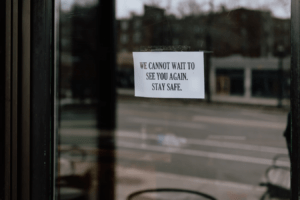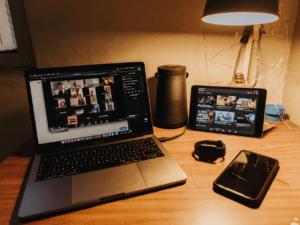
By now, it’s apparent that controlling the COVID-19 outbreak will take longer than anticipated. As the nation watches its favorite restaurants, gyms, and stores shutter their doors for the indefinite future, we are left to wonder what will become of the global economy in 2020. Will the stock market continue to plummet? Is there hope for recovery?
Safety and security are top priorities for everyone now, but it’s likely investors are also contemplating their next moves in today’s volatile market. At Teknos Associates, we’re focusing on supporting our customers with key information and advisory services during a difficult time. Keep reading to learn about how coronavirus is impacting the investment industry.
How has coronavirus affected the U.S. investment industry?

The current crisis affects the investment industry at every level. No matter the investor’s role, holdings, or place in the chain of investments, there’s no doubt we should be preparing for an economy that will remain turbulent for an unforeseeable length of time. However, we can also look at this economic effect as a wake-up call to reinvent investment operations for companies.
Daily asset valuation, as a rule, must change in the era of COVID. Fair value becomes more difficult to track because many companies are in distress or have been forced to liquidate. Further, sharp drops and rises on the Dow Jones Industrial Average in a matter of hours call into focus even more emphasis on measurement dates for determining value. Finally, investment managers must ensure their client’s portfolios are designed to withstand unexpected situations like the one we are currently facing.
However, even the most careful of investment planners can be affected by the coronavirus. Many business continuity plans do not allow for multiple changes occurring at once, which is what we’re seeing now: mass layoffs, a halt in plant/manufacturing operation, little to no travel, third party security risks, and changes in asset valuation, not to mention, unplanned technology breaking points. Simple backup plans, such as employing a remote server backup, aren’t cutting it for the complex problems presented by coronavirus.
In the U.S., fixed income markets are experiencing COVID-related stress. Share prices in publicly traded assets have experienced a 20-30% fall since February 2020. M&A and IPO markets have slowed considerably during Q1 of 2020. Even private equity investment in healthcare services slowed down during the first part of the year.
There is some good news despite volatility. COVID-related stock sell-offs aren’t trading as low as previously shown in the 2008-2009 market crisis. While projected earnings for 2020 are low across the board, this can mean a jump in valuations for 2021. If a company’s 2020 losses are lower than projected, the stock price likely will increase.
How has coronavirus affected international markets?

Studying international markets reveals some more encouraging signs that the market will stabilize in time. Areas of China that suffered early infections of COVID-19 are showing slow but steady recovery, with workers returning to employment and shop doors opening once again. However, time will tell whether China’s economy will improve as its workforce slowly regains momentum.
In contrast, South Korea, a country lauded for its quick and effective efforts to slow the infection rate, still experienced a disastrous Q1 with levels as low as the last downturn in 2008. In addition, recent reports show a concerning re-infection rate. South Korea’s experience may serve as a reminder to other countries that recovery will be a gradual process.
The recent price war on oil between Saudi Arabia and Russia has lowered gas prices and interest rates to a record-breaking low. While gas prices aren’t necessarily a measure for analyzing the stock market, it’s likely low prices will hurt the unconventional oil industry while helping manufacturers save in fuel costs. For the average consumer, the low prices are as good as a tax cut, which might allow consumers to invest resources elsewhere in the market.
What industries are expected to benefit from this economic crisis?

Even though many industries are experiencing a standstill in operations now, there remain a few survivors that may benefit from the economic crisis. Consumer needs are changing quickly in a pandemic era and where those needs fall are important to the investment industry as a whole. Let’s take a look at some markets that are thriving in the age of coronavirus.
- Supermarket Chains and Pharmacies. The need for medical supplies and food continues even as American hunker down in their homes. Stores like Albertsons and CVS are hiring more workers, and even locally-owned grocery stores are experiencing mass lines and sold-out items on a regular basis.
- Retail Markets. Retail giants like Amazon and Walmart are thriving as people are continuing to order necessities as well as diversions to keep their families entertained. Sports items like basketball hoops and toys such as inflatable pools are selling like hotcakes as parents strive for ways to occupy their children. Walmart recently announced a need to hire more workers as well as Amazon, in a push to handle the dramatic spike in recent online sales.
- Transportation and logistics. This industry is not only booming as a result of popular delivery services. Economists are noticing that these numbers account for new hires at warehouses of all kinds, including retail. The transportation industry is actually seeing a 7% increase in hiring since March 2020.
- Healthcare Organizations. These companies operating at the frontline of defense against coronavirus spread are hiring at a faster pace than ever. The necessity of healthcare during the pandemic means hospitals are overworked and are in desperate need of nurses, doctors, and lab technicians who can provide professional support.
What industries will suffer the most from this economic crisis?

- Travel Industry. Cruise and airline stocks are currently dropping at a rapid rate. Shares of major airline companies Delta, United Airlines, and American Airlines are down by 55% total in 2020. The travel industry will likely require bailouts to survive the crisis.
- Restaurant Industry. Social distancing measures in almost every city have required local restaurants to stop serving patrons. While some restaurants continue to deliver food through delivery services like Postmates, it is probable that numerous dining establishments are suffering from the low foot traffic caused by shelter-in-place guidelines.
- Energy Industry. The low prices in gas may be exciting for consumers, but with oil prices at below $40 a barrel, defaults are inevitable. According to Barrons, energy companies are the most at risk of going under during this crisis.
How will this affect startups and emerging markets?

68% of startup investors polled have indicated that COVID-19 will have a negative impact on early-stage investment activity. The same respondents were asked whether they had an interest in any sectors in light of the coronavirus crisis, and 48% showed interest in healthcare, 42% in remote work, 32% in logistics, and 28% in productivity software.
Startups and small businesses may have to pivot their company goals toward industries that are more successful in a pandemic. In addition, funding cutbacks may become a regular concern as the market changes. Finally, attracting investors can be difficult because previously reliable data no longer applies in the current volatile market.
The most immediate concern for startups during coronavirus are the combined effects of stunted revenue and dwindling cash reserves. Startups typically plan their funding rounds to last 12-24 months. According to Pitchbook’s data, this means there are over 7,000 companies that need to replenish their capital soon. Without a continuous stream of revenue, startups are pressed to decide whether to request aid from the government or reach out to venture capitalists for help.
Any companies who are due to secure financing will experience challenges and delays as the pandemic continues. Seeking out funding, whether from the government or venture capitalists, is difficult now. Government aid programs are overwhelmed and venture capitalists have become cautious about entering into deals. Experts predict a number of startup failures should the economic effects of the pandemic last for more than a year.
What can businesses do to move forward?

Each business is experiencing its own unique set of challenges during the pandemic, but here are some helpful tips to help companies gain some footing on shaky ground:
- Make a plan of action. Whether social distancing measures and shelter-in-place rules continue for a month or six months, businesses must plan for the worst-case scenario. As state and federal governments continue to extend COVID-19 reduction measures, we could potentially be in lockdown through the fall of 2020. If so, businesses should prioritize managing cash flow and explore ways to continue earning money. Though responses have been slow, part of planning ahead may involve applying for the Paycheck Protection Program or the Economic Injury Disaster Loan Program.
- Revamp your business. Businesses staying afloat right now have opened new channels for income and revamped their stock to meet consumer needs. Brick and mortar businesses might look into optimizing their websites for online purchases and look into advertising through social media. Some local stores have introduced free delivery of their products within 10 miles while enforcing “no contact drop-offs.” Some retail businesses have managed to stay relevant by adding face masks to their inventory and offering a charity donation with every purchase.
- Increase communication lines. Keeping a remote team involved and enthusiastic about work is becoming more difficult. This is understandable since many people are juggling numerous responsibilities at the moment, such as at-home schooling, child care, working from home, following rigorous cleanliness procedures, and taking care of mental health needs. Despite these challenges, team leaders should stay virtually accessible so that employees will feel supported and connected. Remote check-ins and regular phone calls can encourage everyone at the company to stay focused.
- Cut overhead to save costs and hang on to cash. For some, the outbreak has proven that certain overhead costs are not necessary for running their businesses. For example, business owners that find their company can thrive remotely need not continue leases for commercial space. Or businesses with multiple offices can size down to one office. Anything businesses can do now to retain cash is key to surviving the economic effects of coronavirus.
Closing thoughts

It is clear from studying both domestic and international markets affected by COVID-19 that the only constant is change. With the global economy changing from day to day, the only solution is to hang on as best we can until the market stabilizes. For investors, it’s a matter of ensuring your portfolio can withstand the topsy-turvy nature of today’s economy.
In times of rapid change, it’s crucial to work with an advisor with expertise in complex variables. At Teknos Associates, we bring our specialized knowledge to the table to help growth companies and their investors in a variety of fields, including information technology, esports, gaming, life sciences, alternative energy, blockchain technology, and cryptocurrency. Though times are tough now, we’re here to provide you with valuation and advisory services for whatever situation you’re going through, including one that keeps you washing your hands 25 times a day. To learn more, feel free to contact us at info@teknosassociates.com.
Coronavirus Impacts On The Investment Industry: What You Need To Know
By now, it’s apparent that controlling the COVID-19 outbreak will take longer than anticipated. As the nation watches its favorite restaurants, gyms, and stores shutter their doors for the indefinite future, we are left to wonder what will become of the global economy in 2020. Will the stock market continue to plummet? Is there hope for recovery?
Safety and security are top priorities for everyone now, but it’s likely investors are also contemplating their next moves in today’s volatile market. At Teknos Associates, we’re focusing on supporting our customers with key information and advisory services during a difficult time. Keep reading to learn about how coronavirus is impacting the investment industry.
How has coronavirus affected the U.S. investment industry?
The current crisis affects the investment industry at every level. No matter the investor’s role, holdings, or place in the chain of investments, there’s no doubt we should be preparing for an economy that will remain turbulent for an unforeseeable length of time. However, we can also look at this economic effect as a wake-up call to reinvent investment operations for companies.
Daily asset valuation, as a rule, must change in the era of COVID. Fair value becomes more difficult to track because many companies are in distress or have been forced to liquidate. Further, sharp drops and rises on the Dow Jones Industrial Average in a matter of hours call into focus even more emphasis on measurement dates for determining value. Finally, investment managers must ensure their client’s portfolios are designed to withstand unexpected situations like the one we are currently facing.
However, even the most careful of investment planners can be affected by the coronavirus. Many business continuity plans do not allow for multiple changes occurring at once, which is what we’re seeing now: mass layoffs, a halt in plant/manufacturing operation, little to no travel, third party security risks, and changes in asset valuation, not to mention, unplanned technology breaking points. Simple backup plans, such as employing a remote server backup, aren’t cutting it for the complex problems presented by coronavirus.
In the U.S., fixed income markets are experiencing COVID-related stress. Share prices in publicly traded assets have experienced a 20-30% fall since February 2020. M&A and IPO markets have slowed considerably during Q1 of 2020. Even private equity investment in healthcare services slowed down during the first part of the year.
There is some good news despite volatility. COVID-related stock sell-offs aren’t trading as low as previously shown in the 2008-2009 market crisis. While projected earnings for 2020 are low across the board, this can mean a jump in valuations for 2021. If a company’s 2020 losses are lower than projected, the stock price likely will increase.
How has coronavirus affected international markets?
Studying international markets reveals some more encouraging signs that the market will stabilize in time. Areas of China that suffered early infections of COVID-19 are showing slow but steady recovery, with workers returning to employment and shop doors opening once again. However, time will tell whether China’s economy will improve as its workforce slowly regains momentum.
In contrast, South Korea, a country lauded for its quick and effective efforts to slow the infection rate, still experienced a disastrous Q1 with levels as low as the last downturn in 2008. In addition, recent reports show a concerning re-infection rate. South Korea’s experience may serve as a reminder to other countries that recovery will be a gradual process.
The recent price war on oil between Saudi Arabia and Russia has lowered gas prices and interest rates to a record-breaking low. While gas prices aren’t necessarily a measure for analyzing the stock market, it’s likely low prices will hurt the unconventional oil industry while helping manufacturers save in fuel costs. For the average consumer, the low prices are as good as a tax cut, which might allow consumers to invest resources elsewhere in the market.
What industries are expected to benefit from this economic crisis?
Even though many industries are experiencing a standstill in operations now, there remain a few survivors that may benefit from the economic crisis. Consumer needs are changing quickly in a pandemic era and where those needs fall are important to the investment industry as a whole. Let’s take a look at some markets that are thriving in the age of coronavirus.
What industries will suffer the most from this economic crisis?
How will this affect startups and emerging markets?
68% of startup investors polled have indicated that COVID-19 will have a negative impact on early-stage investment activity. The same respondents were asked whether they had an interest in any sectors in light of the coronavirus crisis, and 48% showed interest in healthcare, 42% in remote work, 32% in logistics, and 28% in productivity software.
Startups and small businesses may have to pivot their company goals toward industries that are more successful in a pandemic. In addition, funding cutbacks may become a regular concern as the market changes. Finally, attracting investors can be difficult because previously reliable data no longer applies in the current volatile market.
The most immediate concern for startups during coronavirus are the combined effects of stunted revenue and dwindling cash reserves. Startups typically plan their funding rounds to last 12-24 months. According to Pitchbook’s data, this means there are over 7,000 companies that need to replenish their capital soon. Without a continuous stream of revenue, startups are pressed to decide whether to request aid from the government or reach out to venture capitalists for help.
Any companies who are due to secure financing will experience challenges and delays as the pandemic continues. Seeking out funding, whether from the government or venture capitalists, is difficult now. Government aid programs are overwhelmed and venture capitalists have become cautious about entering into deals. Experts predict a number of startup failures should the economic effects of the pandemic last for more than a year.
What can businesses do to move forward?
Each business is experiencing its own unique set of challenges during the pandemic, but here are some helpful tips to help companies gain some footing on shaky ground:
Closing thoughts
It is clear from studying both domestic and international markets affected by COVID-19 that the only constant is change. With the global economy changing from day to day, the only solution is to hang on as best we can until the market stabilizes. For investors, it’s a matter of ensuring your portfolio can withstand the topsy-turvy nature of today’s economy.
In times of rapid change, it’s crucial to work with an advisor with expertise in complex variables. At Teknos Associates, we bring our specialized knowledge to the table to help growth companies and their investors in a variety of fields, including information technology, esports, gaming, life sciences, alternative energy, blockchain technology, and cryptocurrency. Though times are tough now, we’re here to provide you with valuation and advisory services for whatever situation you’re going through, including one that keeps you washing your hands 25 times a day. To learn more, feel free to contact us at info@teknosassociates.com.